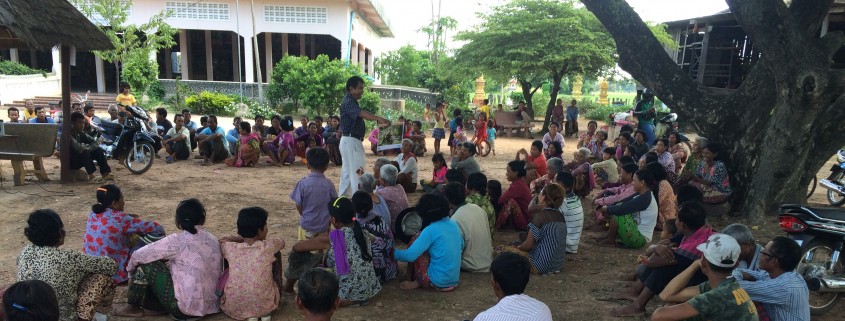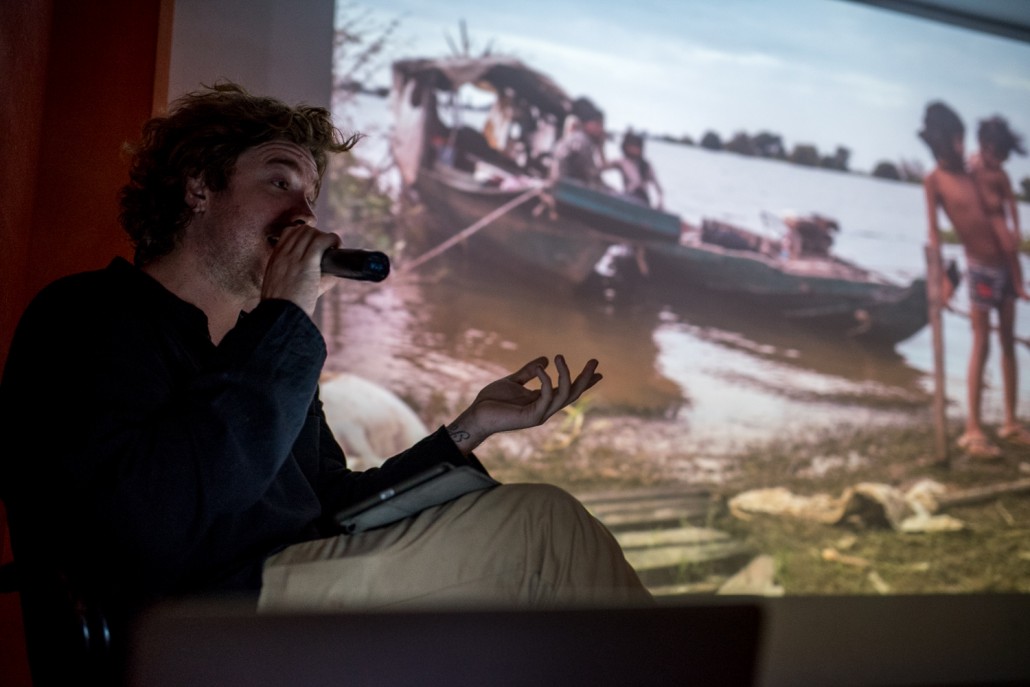Field Notes for November and December 2015
Cambodia
From the post-project monitoring and evaluation activities of previous projects, delivered under the Community Water Enterprise (CWE) programme in Cambodia, we identified the inability (of the water management committee and water entrepreneur) to raise demand levels of bottled water as a key challenge to the financial sustainability of the water service delivery.
As such, we recently piloted a clean water demand creation initiative that was implemented in Krang Svay commune, Prey Veng province, where we had previously delivered a clean water project (under the CWE programme) in March 2015. Monitoring data showed low take-up rate of the bottled water in the commune and as the stakeholders are very enthusiastic and committed, we selected this location to pilot the new initiative.
This involved the engagement, training and deployment of 8 village water promoters who visited each of the 1,743 households in the commune as well as the setting up of retail distribution points at 27 village grocery stores. The initial results have been encouraging, with the reach of the water service delivery increasing by 12 percentage points at the end of the 3-month pilot. We will continue to monitor the outcomes of the pilot and may extend it to more project locations in the coming months, testing its efficacy and finding ways to make the process more efficient.
Separately, 631 villagers attended our village talks promoting safe hygiene practices, a key component of our Community Water Enterprise programme, in the 15 villages in Phnom Dei and Bos Sbov communes in Banteay Meanchey province. The CWE projects in these 2 communes are being implemented as an extension to the Asian Development Bank funded Community Pond projects, in partnership with the Ministry of Rural Development.
China
All 12 of the projects initiated under the 6th batch of our Village Water Management programme in China have been completed, with final inspections of the completed water infrastructure for 8 of these conducted in December (the rest had already been inspected much earlier). The projects in the 2 villages of Babu and Taihe in Yunnan; 3 villages of Beihu, Qiaotoujuwei, and Zhongba in Chongqing; 7 villages of Daba, Tiantai, Baoyuan, Lianhe, Huangtian, Nabei, and Xincai in Guizhou, will provide continuous and sufficient clean water to 13,392 rural poor, through water storage and distribution networks bringing the piped water directly to their households.
This batch of projects benefitted greatly from the participation and support of CITIC Envirotech, whose employees volunteered their time to speak at our workshop (for the 6th batch, held in September 2014), sharing their experiences and knowledge on project management, construction safety, as well as professional development. They also provided professional advice on the engineering design of the infrastructure for the projects which they generously co-funded as part of our multi-year agreement.
Following the review and evaluation process of the 30 proposals received from the workshop for the 8th batch of our Village Water Management programme in China, 13 were finally selected for implementation. Of these, 5 are located in the province of Hunan, 6 in the province of Guizhou and 2 in the province of Shandong. The projects in Shandong represent our first foray into this province and we conducted a training session at the 2 villages in Shandong, which was attended by 10 of the project stakeholders.
Vietnam
Having concluded our projects in the delta region of Vietnam at the end of 2014, 2015 saw us embark on exploratory activities in other regions of Vietnam, as we were unable to identify suitable new locations in the delta area for our interventions. According to the Joint Monitoring Programme, Vietnam now boasts a 96.9% rural coverage rate for improved water supply.
We identified the mountainous region of Northeast Vietnam as a possible area in which we could reach out to rural poor communities still lacking in clean water access and partnered with WARECOD, to conduct in-depth research and analysis of the water and sanitation situation of the communities there. Phase I of our research has been completed and we are now in Phase II, having selected 2 villages each in the Bac Quang and Vi Xuyen districts, for further study to identify possible resource gaps and challenges that we can target with our interventions.
Myanmar
Our pilot project in Tetma village, Magwe division, has finally reached the construction phase, with project details finalised with all stakeholders during our recent site visit. This pilot is being implemented in partnership with the Myanmar Engineering Society (MES) and involves the implementation of a gravity-fed piped system that will distribute water from an existing tube well to shared water points in the village. At the same time, we will also test the viability of pumping water (from the well) with a solar powered pump. This pilot, like all our projects, incorporates components of health and hygiene promotion, and the setting up and training of water management committees.

Signing of the Memorandum of Understanding (MOU) with the Myanmar Engineering Society (MES) on 30th September 2015
Singapore
On 19th November, we participated in the Green Night: Marketplace, where 5 other organisations in the non-profit environmental sector in Cambodia also showcased their work and products. Held at the Meta House in Phnom Penh, the Green Night is a bimonthly event, comprising a marketplace and series of talks, for media and development sector professionals to gather and exchange ideas on regional environmental issues.
For this edition of the Green Night, our partner for A River’s Tail, Longtail Media, were also the keynote speakers, and gave a moving presentation of their experiences working on A River’s Tail, a yearlong multimedia exploration of the Mekong River. The presentation captivated the audience of roughly 80 environmental experts and media enthusiasts with stories of the people they met along the way, the water and environmental issues facing the Mekong, and the benefits and challenges they faced working on this ambitious documentary.








